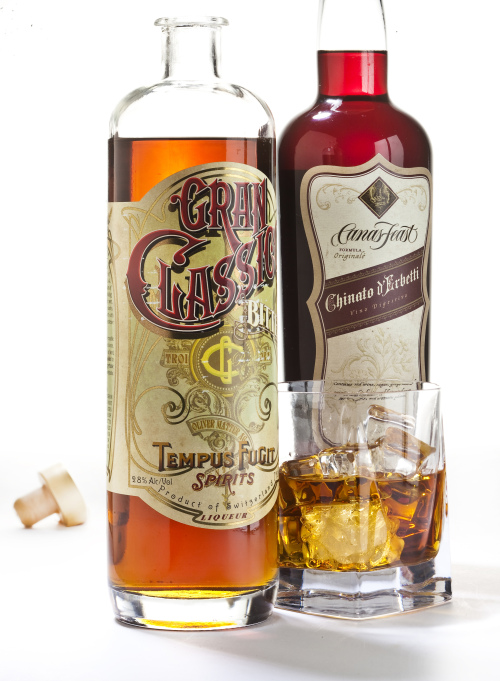It’s a bitter world out there ― bitter as in a growing tide of cocktail bitters, digestifs and aperitifs.
The taste imparted by bitter herbs, roots and tree bark isn’t for everyone. But I like the flavor, especially in pre- and after-dinner drinks, and am intrigued when encountering a new one (or at least, new to me).
Two such drinks, one a bitter, the other a vermouth, caught our eye, and palate, recently ― one created in the Italian style but hailing from Switzerland, the other made here in the States, again after an Italian tradition.
Gran Classico Bitter
The creators, Tempus Fugit Spirits, have Gran Classico made at a Swiss distillery according to the source recipe ― the original bitter of Turin, developed in the 1860s. “It’s what we believe Campari is based on,” says Peter Schaf, who directs product development for Tempus Fugit, based in Petaluma, California.
But Gran Classico is more like an amaro, an Italian class of bitter digestifs (digestivi, in Italian). Wormwood, gentian, orange peel, rhubarb and other botanicals are macerated in a neutral spirit, which is then strained and sweetened with a simple syrup and honey.
Unadorned, the drink is herbal, a touch medicinal, with notes of citrus and anise. It tastes sweet but at the same time has a strong bitter finish ― perhaps fit for sipping straight by only the most ardent amaro fans.
Pour it over ice and splash in soda water, however, and you’ve got a refreshing aperitif with complex flavor and aroma that go on and on. Or sub it for Campari in a negroni.
● Try it:
Distributed in the Midwest and both coasts; for information visit granclassico.com.
 |
Bitter liqueurs, including Chinato d’Erbetti from Canas Feast and Gran Classico from Tempus Fugit, can be served over ice and soda or in a cocktail. (Bill Hogan/Chicago Tribune/MCT) |
Chinato d’Erbetti
The original chinato hails from the Piedmont region of Italy, where it is made from the region’s famed Barolo wine, instead of the neutral spirit used for bitters.
Cana’s Feast Winery in Oregon has turned some of its nebbiolo (the grape of Barolo) into its own version of the Italian digestivo. The flavor has a hint of cloves and cardamom, with the wine in the background and a bright berry finish. “I wanted to make something that would have a very broad appeal, but also stand up to the most advanced of palates,” says winemaker Patrick Taylor.
We like it before dinner, despite its billing, with soda and ice. It also would perform well in cocktails where you want its herbal depth and hint of sweetness.
● Try it:
Limited distribution outside of Oregon; your best bet is ordering online at canasfeastwinery.com.
By Joe Gray
(Chicago Tribune)







![[Today’s K-pop] Blackpink’s Jennie, Lisa invited to Coachella as solo acts](http://res.heraldm.com/phpwas/restmb_idxmake.php?idx=644&simg=/content/image/2024/11/21/20241121050099_0.jpg)
